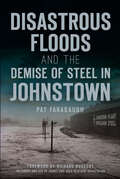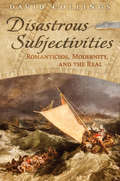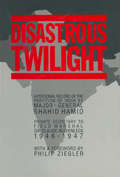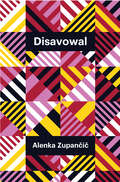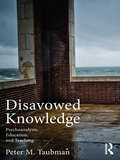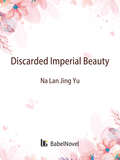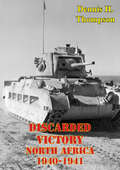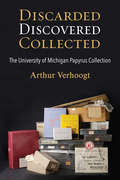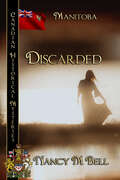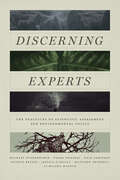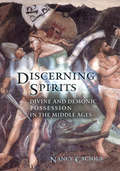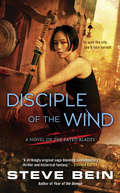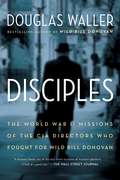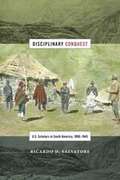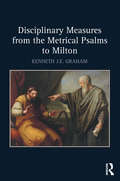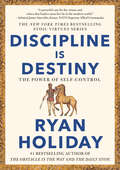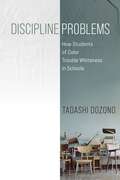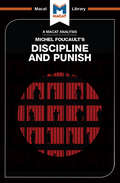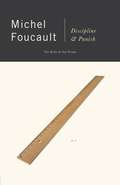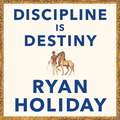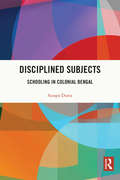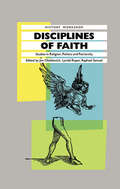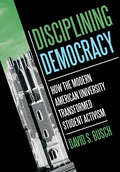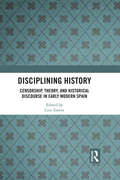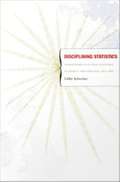- Table View
- List View
Disastrous Floods and the Demise of Steel in Johnstown (Disaster)
by Pat FarabaughJohnstown is synonymous with floodwaters and steel. When the city was decimated by a flood of biblical proportions in 1889, it was considered one of the worst natural disasters in American history and gained global attention. Sadly, that deluge was only the first of three major floods to claim lives and wreak havoc in the region. The destruction in the wake of the St. Patrick's Day flood in 1936 was the impetus for groundbreaking federal and local flood control measures. Multiple dam failures, including the Laurel Run Dam in July 1977, left a flooded Johnstown with a failing steel industry in ruins. Author Pat Farabaugh charts the harrowing history of Johnstown's great floods and the effects on its economic lifeblood.
Disastrous Subjectivities: Romaniticism, Modernity, and the Real
by David CollingsIn sharply original readings of Mary Wollstonecraft, William Godwin, William Wordsworth, Lord Byron, and Percy Bysshe Shelley, Disastrous Subjectivities explores modernity's failed promise to bring about a just social order. Drawing on Kantian critical philosophy and Lacanian theory, this book traverses aspects of the history of science, the form of the novel, the limits of historicism, and the impasses of moral autonomy. What passes for modernity takes shape not as truly modern or secular, but as a mode perpetually haunted by a traumatic sublime. The demand to realize justice within history turns out to require more than history can make possible, and more than the subject can bear.
Disastrous Twilight: A Personal Record of the Partition of india by Major-General Shahid Hamid
by Shahid AmidThe Partition of India in 1947 probably created more problems than it solved, problems which have bedevilled the subcontinent ever since and which show no sign of going away, since those who feel that they were hard done by at the time of the settlement nearly forty years ago harbour their grudges as fiercely as ever and clearly have no intention of accepting- their lot with equanimity in the foreseeable future. Any new assessment of the Partition is therefore doubly welcome - both as a contribution to history and as an aid to an understanding of what, in current jargon, is still very much an "on-going situation". General Hamid's book is of particular value in view of the unique vantage point from which it was written. In 1946 he was appointed Personal Secretary to Field-Marshal Sir Claude Auchinleck, then Commander-in-Chief, India. Realising that he had the good fortune to have been given a ringside seat for possibly the greatest of all the dramas in his country's history. Hamid decided to keep a diary which is only now being published because the author was made to promise that it would appear during the Auk's lifetime, a gesture typical of that very great and good but essentially private man. Hamid was in constant contact with all those people the sum of whose decisions were to lead to one of the greatest mass migrations, accompanied by one of the greatest mass migrations, accompanied by one of the greatest bloodbaths in the history of mankind. His observations on the build-up to this appalling tragedy have the added value of being untainted by hindsight, and though many may not agree with all his opinions, few will deny that the views he expressed at the time have stood up to the judgement of history remarkably well.
Disavowal (Theory Redux)
by Alenka ZupančičThis book argues that the psychoanalytic concept of disavowal best renders the structure underlying our contemporary social response to traumatic and disturbing events, from climate change to unsettling tectonic shifts in our social tissue. Unlike denialism and negation, disavowal functions by fully acknowledging what we disavow. Zupančič contends that disavowal, which sustains some belief by means of ardently proclaiming the knowledge of the opposite, is becoming a predominant feature of our social and political life. She also shows how the libidinal economy of disavowal is a key element of capitalist economy. The concept of fetishistic disavowal already exposes the objectified side of the mechanism of the disavowal, which follows the general formula: I know well, but all the same, the object-fetish allows me to disregard this knowledge. Zupančič adds another twist by showing how, in the prevailing structure of disavowal today, the mere act of declaring that we know becomes itself an object-fetish by which we intercept the reality of that very knowledge. This perverse deployment of knowledge deprives it of any reality.This structure of disavowal can be found not only in the more extreme and dramatic cases of conspiracy theories and re-emerging magical thinking, but even more so in the supposedly sober continuation of business as usual, combined with the call to adapt to the new reality. To disrupt this social embedding of disavowal, it is not enough to change the way we think: things need to change, and hence the way they think for us.
Disavowed Knowledge: Psychoanalysis, Education, and Teaching (Studies in Curriculum Theory Series)
by Peter Maas TaubmanThis is the first and only book to detail the history of the century-long relationship between education and psychoanalysis. Relying on primary and secondary sources, it provides not only a historical context but also a psychoanalytically informed analysis. In considering what it means to think about teaching from a psychoanalytic perspective and in reviewing the various approaches to and theories about teaching and curriculum that have been informed by psychoanalysis in the twentieth century, Taubman uses the concept of disavowal and focuses on the effects of disavowed knowledge within both psychoanalysis and education and on the relationship between them. Tracing three historical periods of the waxing and waning of the medical/therapeutic and emancipatory projects of psychoanalysis and education, the thrust of the book is for psychoanalysis and education to come together as an emancipatory project. Supplementing the recent work of educational scholars using psychoanalytic concepts to understand teaching, education, and schooling, it works to articulate the stranded histories ─ the history of what could have been and might still be in the relationship between psychoanalysis and education.
Discarded Imperial Beauty: Volume 1 (Volume 1 #1)
by Na LanJingYuThe bustling hall was filled with the colors of celebration as the joyous official sang loudly amidst the hubbub, "I bow to the heavens and earth!"
Discarded Victory - North Africa, 1940-1941
by Dennis H. ThompsonThe Anglo-Italian campaign of 1940-41 resulted in one of the most lopsided operational victories of the entire Second World War. Strategic misjudgement at the highest levels of British political and military leadership would discard the opportunities won by its fighting forces in North Africa and commit them to a catastrophic intervention in Greece. In 1940, Italy fielded a numerically overwhelming, but technologically deficient, conscript military force on the continent of Africa. Italy’s political leaders expected her 500,000 strong North African army to quickly defeat the British troops stationed in the theater of operation. The British forces, though inferior in numbers, were well-trained regulars who possessed more superior weaponry than their Italian foes. In the brief, high intensity conflict waged in the North African deserts from December 1940 to February 1941, the British would annihilate an Italian army of 130,000 soldiers. On the verge of complete victory in the North African theater, the British would commit an act of extraordinary strategic misjudgement and divert their efforts to Greece in order to engage the Axis forces on the continent of Europe. The discarded early victory in North Africa would lead Britain to catastrophe in Greece, cost them the initiative in the war, and nearly led to their defeat in North Africa.
Discarded, Discovered, Collected: The University of Michigan Papyrus Collection
by Arthur VerhoogtDiscarded, Discovered, Collected provides an accessible introduction to the University of Michigan’s collection of papyri and related ancient materials, the widest and deepest resource of its kind in the Western hemisphere. The collection was founded in the early part of the 20th century by University of Michigan Professor of Classics Francis W. Kelsey. His original intention was to create a set of artifacts that would be useful in teaching students more directly about the ancient world, at a time when trips to ancient sites were much harder to arrange. Jointly administered by Michigan’s Department of Classical Studies and its Library, the collection has garnered significant interest beyond scholarly circles and now sees several hundred visitors each year. Of particular note among its holdings are sixty pages of the earliest known copy of the Epistles of St. Paul, which are often featured on tours of the collection by groups from religious institutions. Arthur Verhoogt, one of the current stewards of the Papyrology Collection, provides clear, insightful information in an appealing style to engage general readers and scholars alike. Extensively illustrated with some of the collection’s more spectacular pieces, this volume describes what the collection is, what kinds of ancient texts it contains, and how it has developed from Francis Kelsey’s day to the present. Verhoogt describes in detail how people who study papyri carry out their work, and how papyri contribute to our understanding of various aspects of the ancient Greco-Roman world. Translations of the ancient texts are presented so that the reader can experience some of the excitement that comes with reading original documents from many centuries ago.
Discarded: Canadian Historical Mysteries (Canadian Historical Mysteries)
by Nancy M. BellWhen the British arrived in Winnipeg in the 1800s it was convenient for the men to take Metis wives. They were called a la vacon du pays – according to the custom of the country. These women bore the brunt of ensuring survival in the harsh environment. Without them the British army and fur traders would not have survived the brutal winters. However, as society evolved it became accepted that wives must be white, schooled in British ways, fashionable in the European sense and married by the Anglican church. The Metis wives and their ‘country born’ offspring were thrown out and forced to fend for themselves. The unrepentant husbands continued to live comfortably with their ‘new’ wives. It was inevitable that some discarded wives did not accept their fate quietly and hard feelings on both sides were unavoidable. When the bodies of two discarded Metis wives, Marguerite and Marie-Anne, are found floating in the Red River, Guilliame Mousseau, sets out to get to the bottom of his sister Marguerite’s murder.
Discerning Experts: The Practices of Scientific Assessment for Environmental Policy
by Milena Wazeck Naomi Oreskes Dale Jamieson Michael Oppenheimer Keynyn Brysse Jessica O’Reilly Matthew ShindellDiscerning Experts assesses the assessments that many governments rely on to help guide environmental policy and action. Through their close look at environmental assessments involving acid rain, ozone depletion, and sea level rise, the authors explore how experts deliberate and decide on the scientific facts about problems like climate change. They also seek to understand how the scientists involved make the judgments they do, how the organization and management of assessment activities affects those judgments, and how expertise is identified and constructed. Discerning Experts uncovers factors that can generate systematic bias and error, and recommends how the process can be improved. As the first study of the internal workings of large environmental assessments, this book reveals their strengths and weaknesses, and explains what assessments can—and cannot—be expected to contribute to public policy and the common good.
Discerning Spirits: Divine and Demonic Possession in the Middle Ages
by Nancy CaciolaTrance states, prophesying, convulsions, fasting, and other physical manifestations were often regarded as signs that a person was seized by spirits. In a book that sets out the prehistory of the early modern European witch craze, Nancy Caciola shows how medieval people decided whom to venerate as a saint infused with the spirit of God and whom to avoid as a demoniac possessed of an unclean spirit. This process of discrimination, known as the discernment of spirits, was central to the religious culture of Western Europe between 1200 and 1500. Since the outward manifestations of benign and malign possession were indistinguishable, a highly ambiguous set of bodily features and behaviors were carefully scrutinized by observers. Attempts to make decisions about individuals who exhibited supernatural powers were complicated by the fact that the most intense exemplars of lay spirituality were women, and the "fragile sex" was deemed especially vulnerable to the snares of the devil. Assessments of women's spirit possessions often oscillated between divine and demonic interpretations. Ultimately, although a few late medieval women visionaries achieved the prestige of canonization, many more were accused of possession by demons. Caciola analyzes a broad array of sources from saints' lives to medical treatises, exorcists' manuals to miracle accounts, to find that observers came to rely on the discernment of bodies rather than seeking to distinguish between divine and demonic possession in purely spiritual terms.
Disciple of the Wind
by Steve BeinLETHAL JUSTICEWhen Tokyo falls victim to a deadly terrorist attack, Detective Sergeant Mariko Oshiro knows who is responsible, even if she doesn't have proof. She urges her commanding officers to arrest the perpetrator--an insane zealot who was just released from police custody. When her pleas fall on deaf ears, she loses her temper and then her badge, as well as her best chance of fighting back.Left on her own, and armed with only her cunning and her famed Inazuma blade, Mariko must work outside the system to stop a terrorist mastermind. But going rogue draws the attention of an underground syndicate known as the Wind. For centuries, they have controlled Japanese politics from the shadows, using mystical relics to achieve their nefarious ends--relics like Mariko's own sword and the iron demon mask whose evil curse is bound to the blade. Now the Wind is set on acquiring Mariko.Mariko is left with a perilous choice: Join an illicit insurgency to thwart a deadly villain, or remain true to the law. Either way, she cannot escape her sword's curse. As sure as the blade will bring her to victory, it also promises to destroy her....
Disciples: The World War II Missions of the CIA Directors Who Fought for Wild Bill Donovan
by Douglas WallerThe author of the critically acclaimed bestseller Wild Bill Donovan, tells the story of four OSS warriors of World War II. All four later led the CIA.They are the most famous and controversial directors the CIA has ever had--Allen Dulles, Richard Helms, William Colby, and William Casey. Disciples is the story of these dynamic agents and their daring espionage and sabotage in wartime Europe under OSS Director Bill Donovan. Allen Dulles ran the OSS's most successful spy operation against the Axis. Bill Casey organized dangerous missions to penetrate Nazi Germany. Bill Colby led OSS commando raids behind the lines in occupied France and Norway. Richard Helms mounted risky intelligence programs against the Russians in the ruin of Berlin after the German surrender. Four very different men, they later led (or misled) the successor CIA. Dulles launched the calamitous operation to land CIA-trained, anti-Castro guerrillas at Cuba's Bay of Pigs. Helms was convicted of lying to Congress about the CIA's effort to oust Chile's president. Colby would become a pariah for releasing to Congress what became known as the "Family Jewels" report on CIA misdeeds during the 1950s, sixties and early seventies. Casey would nearly bring down the CIA--and Ronald Reagan's presidency--from a scheme to secretly supply Nicaragua's contras with money raked off from the sale of arms to Iran for American hostages in Beirut. Mining thousands of once-secret World War II documents and interviewing scores of family members and CIA colleagues, Waller has written a brilliant successor to Wild Bill Donovan.
Disciplinary Conquest: U.S. Scholars in South America, 19001945
by Ricardo D. SalvatoreIn Disciplinary Conquest Ricardo D. Salvatore rewrites the origin story of Latin American studies by tracing the discipline's roots back to the first half of the twentieth century. Salvatore focuses on the work of five representative U.S. scholars of South America--historian Clarence Haring, geographer Isaiah Bowman, political scientist Leo Rowe, sociologist Edward Ross, and archaeologist Hiram Bingham--to show how Latin American studies was allied with U.S. business and foreign policy interests. Diplomats, policy makers, business investors, and the American public used the knowledge these and other scholars gathered to build an informal empire that fostered the growth of U.S. economic, technological, and cultural hegemony throughout the hemisphere. Tying the drive to know South America to the specialization and rise of Latin American studies, Salvatore shows how the disciplinary conquest of South America affirmed a new mode of American imperial engagement.
Disciplinary Measures from the Metrical Psalms to Milton
by Kenneth J.E. GrahamDisciplinary Measures from the Metrical Psalms to Milton studies the relationship between English poetry and church discipline in four carefully chosen bodies of poetry written between the Reformation and the death of John Milton. Its primary goal is to fill a gap in the field of Protestant poetics, which has never produced a study focused on the way in which poetry participates in and reflects on the post-Reformation English Church's attempts to govern conduct. Its secondary goal is to revise the understandings of discipline which social theorists and historians have offered, and which literary critics have largely accepted. It argues that knowledge of the early modern culture of discipline illuminates some important poetic traditions and some major English poets, and it shows that this poetry in turn throws light on verbal and affective aspects of the disciplinary process that prove difficult to access through other sources, challenging assumptions about the means of social control, the structures of authority, and the practical implications of doctrinal change. More specifically, Disciplinary Measures argues that while poetry can help us to understand the oppressive potential of church discipline, it can also help us to recover a more positive sense of discipline as a spiritual cure.
Discipline Is Destiny: The Power of Self-Control (The Stoic Virtues Series)
by Ryan HolidayThe instant New York Times, Wall Street Journal, and USA Today Bestseller!In his New York Times bestselling book Courage is Calling, author Ryan Holiday made the Stoic case for a bold and brave life. In this much-anticipated second book of his Stoic Virtue series, Holiday celebrates the awesome power of self-discipline and those who have seized it.To master anything, one must first master themselves–one&’s emotions, one&’s thoughts, one&’s actions. Eisenhower famously said that freedom is really the opportunity to practice self-discipline. Cicero called the virtue of temperance the polish of life. Without boundaries and restraint, we risk not only failing to meet our full potential and jeopardizing what we have achieved, but we ensure misery and shame. In a world of temptation and excess, this ancient idea is more urgent than ever.In Discipline is Destiny, Holiday draws on the stories of historical figures we can emulate as pillars of self-discipline, including Lou Gehrig, Queen Elizabeth II, boxer Floyd Patterson, Marcus Aurelius and writer Toni Morrison, as well as the cautionary tales of Napoleon, F. Scott Fitzgerald and Babe Ruth. Through these engaging examples, Holiday teaches readers the power of self-discipline and balance, and cautions against the perils of extravagance and hedonism.At the heart of Stoicism are four simple virtues: courage, temperance, justice, and wisdom. Everything else, the Stoics believed, flows from them. Discipline is Destiny will guide readers down the path to self-mastery, upon which all the other virtues depend. Discipline is predictive. You cannot succeed without it. And if you lose it, you cannot help but bring yourself failure and unhappiness.
Discipline Problems: How Students of Color Trouble Whiteness in Schools
by Tadashi DozonoAngel, a Black tenth-grader at a New York City public school, self-identifies as a nerd and likes to learn. But she’s troubled that her history classes leave out events like the genocide and dispossession of Indigenous people in the Americas, presenting a sugar-coated image of the United States that is at odds with her everyday experience. “The history I learned in school is simpler,” she says. “The world I live in is a lot more complex.”Angel, like every student interviewed in Discipline Problems, has been identified by teachers as a “troublemaker,” a student whose behavior disrupts classroom norms and interferes with instruction. But her critiques of the curriculum she’s taught speak to her curiosity and insight, crucial foundations for understanding history. Like many students who have been marginalized by systemic racism in American schools, she exposes the shortcomings of her classrooms’ academic environments by challenging both the content and the methods of her education. All too often, these challenges are framed as “troublemaking,” and the students are disciplined for “acting out” instead of being rewarded for their intellectual engagement.Tadashi Dozono, a professor of education and former high school social studies teacher, takes seriously the often-overlooked critiques that students of color who get labeled as troublemakers direct toward their high school history curriculum. He reinterprets “troublemaking,” usually cast as a behavioral deficit, as an intellectual asset and form of reasoning that challenges the “disciplining reason” of classrooms where whiteness is valued over the histories and knowledge of people of color. Dozono shows how what are traditionally framed as discipline problems can be seen through a different lens as responses to educational practices that marginalize non-white students. Discipline Problems reveals how students of color seek out alternate avenues for understanding their world and imagines a pedagogy that champions the curiosity, intellect, and knowledge of marginalized learners.
Discipline and Punish
by Meghan Kallman Rachele DiniMichel Foucault is famous as one of the 20th-century’s most innovative thinkers – and his work on Discipline and Punish was so original and offered models so useful to other scholars that the book now ranks among the most influential academic works ever published. Foucault’s aim is to trace the way in which incarceration was transformed between the seventeenth and twentieth centuries. What started as a spectacle, in which ritual punishments were focused on the prisoner’s body, eventually became a matter of the private disciplining of a delinquent soul. Foucault’s work is renowned for its original insights, and Discipline and Punish contains several of his most compelling observations. Much of the focus of the book is on making new connections between knowledge and power, leading Foucault to sketch out a new interpretation of the relationship between voir, savoir and pouvoir – or, ‘to see is to know is to have power.’ Foucault also dwells in fascinating detail on the true implications of a uniquely creative solution to the problems generated by incarcerating large numbers of criminals in a confined space – Jeremy Bentham’s ‘panopticon,’ a prison constructed around a central tower from which hidden guards might – or might not – be monitoring any given prisoner at any given time. As Foucualt points out, the panopticon creates a prison in which inmates will discipline themselves, for fear of punishment, even when there are no guards present. He goes on to apply this insight to the manner in which all of us behave in the outside world – a world in which CCTV and speed cameras are explicitly designed to modify our behavior. Foucault’s highly original vision of prisons also ties them to broader structures of power, allowing him to argue that all previous conceptions of prison are misleading, even wrong. For Foucault, the ultimate purpose of incarceration is neither to punish inmates, nor to reduce crime. It is to produce delinquency as a way of enabling the state to control and of structure crime.
Discipline and Punish: The Birth of the Prison
by Michel FoucaultIn this brilliant work, the most influential philosopher since Sartre suggests that such vaunted reforms as the abolition of torture and the emergence of the modern penitentiary have merely shifted the focus of punishment from the prisoner's body to his soul.
Discipline is Destiny: The Power of Self-Control
by Ryan HolidayAn inspiring anthem to the power, promise and challenges of self-control, the second in a series examining the timeless Stoic virtues from #1 New York Times bestselling author Ryan HolidayThe inscription on the Oracle of Delphi says: 'Nothing in excess.' C.S. Lewis described temperance as going to the 'right length but no further.' Easy to say, hard to practice - and if it was tough in 300 BCE, or in the 1940s, it feels all but impossible today. Yet it's the most empowering and important virtue any of us can learn.Drawing on ancient Stoic wisdom and examples across history and around the world, Ryan Holiday shows why self-control is so vital, and how to cultivate it in our own lives. Moderation is not about abstinence: it is about creativity, self-respect, focus and balance. Without it, even the most positive traits become vices. But with it, happiness and success are assured: it is the only way to live an extraordinary, fulfilled and effective life.
Disciplined Subjects: Schooling in Colonial Bengal
by Sutapa DuttaThis book examines interactions between Britain and India through the analytical framework of the production and circulation of knowledge throughout the long eighteenth century. Disciplined Subjects is one of the first works to analyse the imperial school curriculum, and the ways in which it shaped and influenced Indian subjectivity. The author focuses on the endeavours of the colonial government, missionaries and native stakeholders in determining the physical, material and intellectual content of institutional learning in India. Further, the volume compares the changes in pedagogical practices, and textbooks in schools in Britain and colonial Bengal, and its subsequent repercussions on the psyche and identity of the learners. Drawing on a host of primary sources in the UK and India, this volume will be of great interest to scholars and researchers of modern history, education, sociology and South Asian studies.
Disciplines of Faith: Studies in Religion, Politics and Patriarchy (History Workshop Ser.)
by Lyndal Roper James ObelkevichFirst Published in 1987. Routledge is an imprint of Taylor & Francis, an informa company.
Disciplining Democracy: How the Modern American University Transformed Student Activism (Histories of American Education)
by David S. BuschDisciplining Democracy reveals the political consequences for the triumph of "service learning" as the dominant pedagogical model of civic engagement in the modern American university. Volunteer-based civic engagement programs in higher education are popularly understood as curricular opportunities that enable young people to engage as citizens in campus and public life. But, as David S. Busch argues, these civic programs are also emblematic of a new political tradition in American higher education—a culture of "disciplining democracy"—that polices the boundaries of appropriate forms of citizenship both for the student and for the university itself.Looking at seven different universities across two political eras, Busch unearths a common institutional trend: that student activists' demand for "action education" in the 1960s—a demand that many believed would reimagine the political role of the university—was reconstituted as university-sponsored volunteer programs by the 1980s. Disconnected from their political roots and visions, these programs became the source for the promotion of service learning as the primary model of the new civics in American higher education and an integral part of institutional strategies for responding to student activism. Embraced by universities big and small, private and public, the triumph of service learning as the new civics narrowed the political terrain of engaged citizenship and set limits on the modern American university's mission. In excavating the genealogy of the new civics and its institutional legacy, Disciplining Democracy offers a new way to understand the university as a political actor in American life.
Disciplining History: Censorship, Theory and Historical Discourse in Early Modern Spain
by Cesc EsteveThe overall purpose of the studies collected together in this volume is to explain the shaping of Hispanic historiography in the Early Modern period by examining the continuities and discursive complicities between the writing, criticism, theory and censorship of history. This book sheds light on the so-far neglected circulation of ideas and practices between these four areas, and highlights the constitutive nature of a wide spectrum of forms of censorship from repression to criticism in shaping the interests, principles, methods and problems of Early Modern Hispanic historiography. Examining the various fronts that converge in this disciplining discourse of history helps expand and improve our understanding of the relations between historiography and civil and ecclesiastic literary censorship, and the implications of the ideological control of historical writing and theory. In many respects their hypotheses, results and conclusions can be extrapolated to Western historiography in the Early Modern period. This book will be of interest to historians of both historiography and Hispanic censorship in the sixteenth and seventeenth centuries, and in general to scholars of historical, literary and political culture in the Early Modern age.
Disciplining Statistics: Demography And Vital Statistics In France And England, 1830-1885
by Libby SchweberIn Disciplining Statistics Libby Schweber compares the science of population statistics in England and France during the nineteenth century, demonstrating radical differences in the interpretation and use of statistical knowledge. Through a comparison of vital statistics and demography, Schweber describes how the English government embraced statistics, using probabilistic interpretations of statistical data to analyze issues related to poverty and public health. The French were far less enthusiastic. Political and scientific lites in France struggled with the "reality" of statistical populations, wrestling with concerns about the accuracy of figures that aggregated heterogeneous groups such as the rich and poor and rejecting probabilistic interpretations. Tracing the introduction and promotion of vital statistics and demography, Schweber identifies the institutional conditions that account for the contrasting styles of reasoning. She shows that the different reactions to statistics stemmed from different criteria for what counted as scientific knowledge. The French wanted certain knowledge, a one-to-one correspondence between observations and numbers. The English adopted an instrumental approach, using the numbers to influence public opinion and evaluate and justify legislation. Schweber recounts numerous attempts by vital statisticians and demographers to have their work recognized as legitimate scientific pursuits. While the British scientists had greater access to government policy makers, and were able to influence policy in a way that their French counterparts were not, ultimately neither the vital statisticians nor the demographers were able to institutionalize their endeavors. By 1885, both fields had been superseded by new forms of knowledge. Disciplining Statistics highlights how the development of "scientific" knowledge was shaped by interrelated epistemological, political, and institutional considerations.
